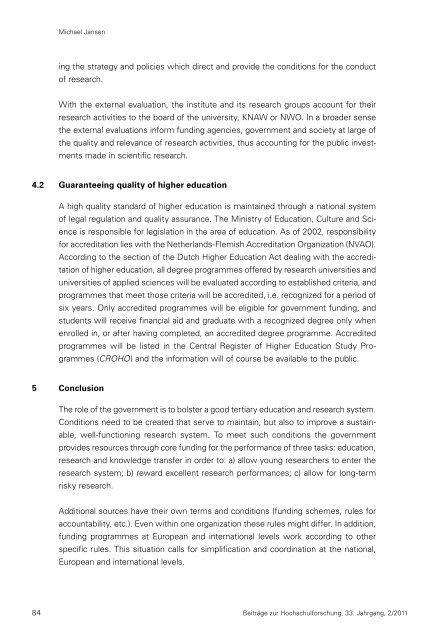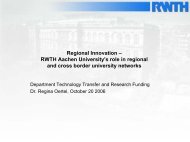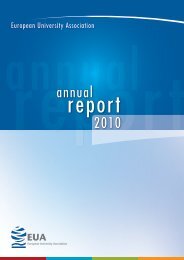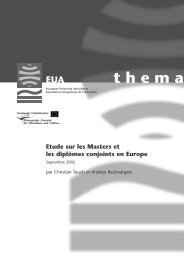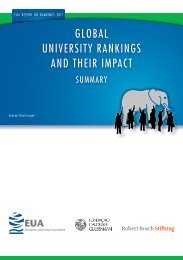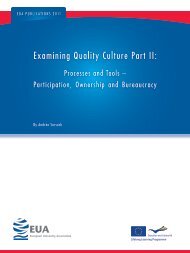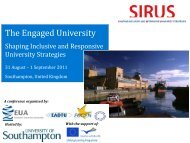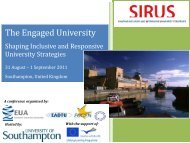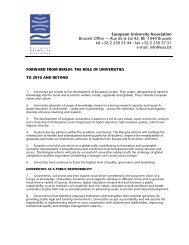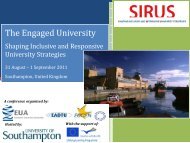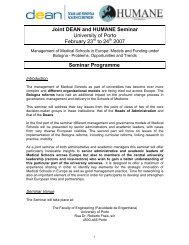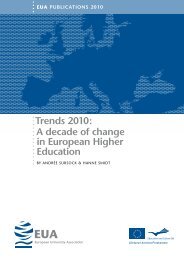Beiträge zur Hochschulforschung - European University Association
Beiträge zur Hochschulforschung - European University Association
Beiträge zur Hochschulforschung - European University Association
You also want an ePaper? Increase the reach of your titles
YUMPU automatically turns print PDFs into web optimized ePapers that Google loves.
84<br />
Michael Jansen<br />
ing the strategy and policies which direct and provide the conditions for the conduct<br />
of research.<br />
With the external evaluation, the institute and its research groups account for their<br />
research activities to the board of the university, KNAW or NWO. In a broader sense<br />
the external evaluations inform funding agencies, government and society at large of<br />
the quality and relevance of research activities, thus accounting for the public invest-<br />
ments made in scientific research.<br />
4.2 Guaranteeing quality of higher education<br />
A high quality standard of higher education is maintained through a national system<br />
of legal regulation and quality assurance. The Ministry of Education, Culture and Sci-<br />
ence is responsible for legislation in the area of education. As of 2002, responsibility<br />
for accreditation lies with the Netherlands-Flemish Accreditation Organization (NVAO).<br />
According to the section of the Dutch Higher Education Act dealing with the accredi-<br />
tation of higher education, all degree programmes offered by research universities and<br />
universities of applied sciences will be evaluated according to established criteria, and<br />
programmes that meet those criteria will be accredited, i.e. recognized for a period of<br />
six years. Only accredited programmes will be eligible for government funding, and<br />
students will receive financial aid and graduate with a recognized degree only when<br />
enrolled in, or after having completed, an accredited degree programme. Accredited<br />
programmes will be listed in the Central Register of Higher Education Study Pro-<br />
grammes (CROHO) and the information will of course be available to the public.<br />
5 Conclusion<br />
The role of the government is to bolster a good tertiary education and research system.<br />
Conditions need to be created that serve to maintain, but also to improve a sustain-<br />
able, well-functioning research system. To meet such conditions the government<br />
provides resources through core funding for the performance of three tasks: education,<br />
research and knowledge transfer in order to: a) allow young researchers to enter the<br />
research system; b) reward excellent research performances; c) allow for long-term<br />
risky research.<br />
Additional sources have their own terms and conditions (funding schemes, rules for<br />
accountability, etc.). Even within one organization these rules might differ. In addition,<br />
funding programmes at <strong>European</strong> and international levels work according to other<br />
specific rules. This situation calls for simplification and coordination at the national,<br />
<strong>European</strong> and international levels.<br />
<strong>Beiträge</strong> <strong>zur</strong> <strong>Hochschulforschung</strong>, 33. Jahrgang, 2/2011


